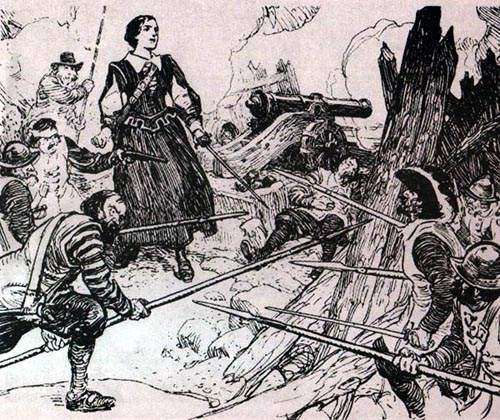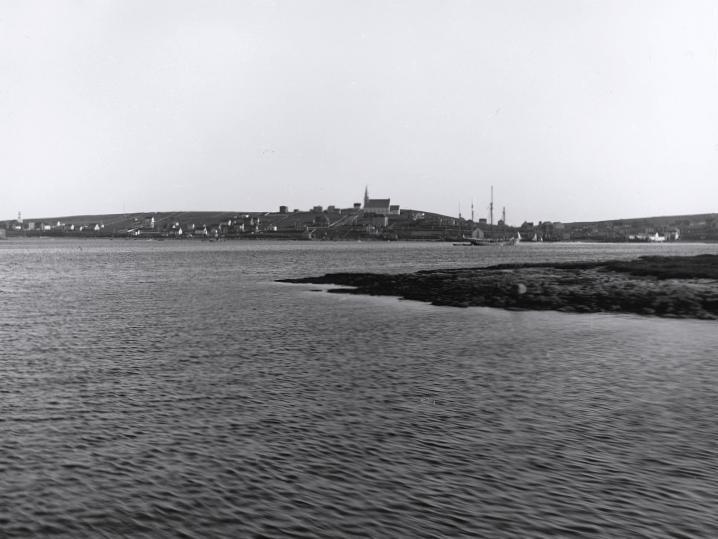|
Battle At Chedabucto (Guysborough)
The Battle of Chedabucto occurred against Fort St. Louis in Chedabucto (present-day Guysborough, Nova Scotia) on June 3, 1690 during King William's War (1689–97). The battle was part of Sir William Phips and New England's military campaign against Acadia. New England sent an overwhelming force to conquer Acadia by capturing the capital Port Royal, Chedabucto, and attacking other villages. The aftermath of these battles was unlike any of the previous military campaigns against Acadia. The violence of the attacks alienated many of the Acadians from the New Englanders, broke their trust, and made it difficult for them to deal amicably with the English-speakers. Historical context Clerbaud Bergier led other merchants from La Rochelle, France in enjoying a fishing monopoly in Acadia. In 1682, Fort St. Louis was established by the Company of Acadia (Compagnie de la Peche Sedentaire) to protect the fishery. The principal port was at Chedabucto Bay, which accounted for fifty fishers in ... [...More Info...] [...Related Items...] OR: [Wikipedia] [Google] [Baidu] |
King William's War
King William's War (also known as the Second Indian War, Father Baudoin's War, Castin's War, or the First Intercolonial War in French) was the North American theater of the Nine Years' War (1688–1697), also known as the War of the Grand Alliance or the War of the League of Augsburg. It was the first of six colonial wars (see the four French and Indian Wars, Father Rale's War and Father Le Loutre's War) fought between New France and New England along with their respective Native allies before France ceded its remaining mainland territories in North America east of the Mississippi River in 1763. For King William's War, neither England nor France thought of weakening their position in Europe to support the war effort in North America. New France and the Wabanaki Confederacy were able to thwart New England expansion into Acadia, whose border New France defined as the Kennebec River in southern Maine. According to the terms of the 1697 Peace of Ryswick that ended the Nine Yea ... [...More Info...] [...Related Items...] OR: [Wikipedia] [Google] [Baidu] |
Mi'kmaq People
The Mi'kmaq (also ''Mi'gmaq'', ''Lnu'', ''Miꞌkmaw'' or ''Miꞌgmaw''; ; ) are a First Nations people of the Northeastern Woodlands, indigenous to the areas of Canada's Atlantic Provinces and the Gaspé Peninsula of Quebec as well as the northeastern region of Maine. The traditional national territory of the Mi'kmaq is named Miꞌkmaꞌki (or Miꞌgmaꞌgi). There are 170,000 Mi'kmaq people in the region, (including 18,044 members in the recently formed Qalipu First Nation in Newfoundland.) Nearly 11,000 members speak Miꞌkmaq, an Eastern Algonquian language. Once written in Miꞌkmaw hieroglyphic writing, it is now written using most letters of the Latin alphabet. The Mi'kmaq, Maliseet, and Pasamaquoddy nations signed a series of treaties known as the Covenant Chain of Peace and Friendship Treaties with the British Crown throughout the eighteenth century; the first was signed in 1725, and the last in 1779. The Miꞌkmaq maintain that they did not cede or give up the ... [...More Info...] [...Related Items...] OR: [Wikipedia] [Google] [Baidu] |
Conflicts In 1690
Conflict may refer to: Arts, entertainment, and media Films * ''Conflict'' (1921 film), an American silent film directed by Stuart Paton * ''Conflict'' (1936 film), an American boxing film starring John Wayne * ''Conflict'' (1937 film), a Swedish drama film directed by Per-Axel Branner * ''Conflict'' (1938 film), a French drama film directed by Léonide Moguy * ''Conflict'' (1945 film), an American suspense film starring Humphrey Bogart * ''Catholics: A Fable'' (1973 film), or ''The Conflict'', a film starring Martin Sheen * ''Judith'' (1966 film) or ''Conflict'', a film starring Sophia Loren * ''Samar'' (1999 film) or ''Conflict'', a 1999 Indian film by Shyam Benegal Games * ''Conflict'' (series), a 2002–2008 series of war games for the PS2, Xbox, and PC * ''Conflict'' (video game), a 1989 Nintendo Entertainment System war game * '' Conflict: Middle East Political Simulator'', a 1990 strategy computer game Literature and periodicals * ''Conflict'' (novel) ... [...More Info...] [...Related Items...] OR: [Wikipedia] [Google] [Baidu] |
Acadian History
The Acadians (french: Acadiens , ) are an ethnic group descended from the French who settled in the New France colony of Acadia during the 17th and 18th centuries. Most Acadians live in the region of Acadia, as it is the region where the descendants of a few Acadians who escaped the Expulsion of the Acadians (aka The Great Upheaval / ''Le Grand Dérangement'') re-settled. Most Acadians in Canada continue to live in majority French-speaking communities, notably those in New Brunswick where Acadians and Francophones are granted autonomy in areas such as education and health. Acadia was one of the 5 regions of New France. Acadia was located in what is now Eastern Canada's Maritime provinces, as well as parts of Quebec and present-day Maine to the Kennebec River. It was ethnically, geographically and administratively different from the other French colonies and the French colony of Canada (modern-day Quebec). As a result, the Acadians developed a distinct history and culture. Th ... [...More Info...] [...Related Items...] OR: [Wikipedia] [Google] [Baidu] |
Conflicts In Nova Scotia
Conflict may refer to: Arts, entertainment, and media Films * ''Conflict'' (1921 film), an American silent film directed by Stuart Paton * ''Conflict'' (1936 film), an American boxing film starring John Wayne * ''Conflict'' (1937 film), a Swedish drama film directed by Per-Axel Branner * ''Conflict'' (1938 film), a French drama film directed by Léonide Moguy * ''Conflict'' (1945 film), an American suspense film starring Humphrey Bogart * ''Catholics: A Fable'' (1973 film), or ''The Conflict'', a film starring Martin Sheen * ''Judith'' (1966 film) or ''Conflict'', a film starring Sophia Loren * ''Samar'' (1999 film) or ''Conflict'', a 1999 Indian film by Shyam Benegal Games * ''Conflict'' (series), a 2002–2008 series of war games for the PS2, Xbox, and PC * ''Conflict'' (video game), a 1989 Nintendo Entertainment System war game * '' Conflict: Middle East Political Simulator'', a 1990 strategy computer game Literature and periodicals * ''Conflict'' (novel) ... [...More Info...] [...Related Items...] OR: [Wikipedia] [Google] [Baidu] |
Military History Of New England
A military, also known collectively as armed forces, is a heavily armed, highly organized force primarily intended for warfare. It is typically authorized and maintained by a sovereign state, with its members identifiable by their distinct military uniform. It may consist of one or more military branches such as an army, navy, air force, space force, marines, or coast guard. The main task of the military is usually defined as defence of the state and its interests against external armed threats. In broad usage, the terms ''armed forces'' and ''military'' are often treated as synonymous, although in technical usage a distinction is sometimes made in which a country's armed forces may include both its military and other paramilitary forces. There are various forms of irregular military forces, not belonging to a recognized state; though they share many attributes with regular military forces, they are less often referred to as simply ''military''. A nation's military may ... [...More Info...] [...Related Items...] OR: [Wikipedia] [Google] [Baidu] |
Military History Of Nova Scotia
Nova Scotia (also known as Mi'kma'ki and Acadia) is a Canadian province located in Canada's Maritimes. The region was initially occupied by Mi'kmaq. The colonial history of Nova Scotia includes the present-day Canadian Maritime provinces and the northern part of Maine (Sunbury County, Nova Scotia), all of which were at one time part of Nova Scotia. In 1763 Cape Breton Island and St. John's Island (now Prince Edward Island) became part of Nova Scotia. In 1769, St. John's Island became a separate colony. Nova Scotia included present-day New Brunswick until that province was established in 1784. (In 1765, the county of Sunbury was created, and included the territory of present-day New Brunswick and eastern Maine as far as the Penobscot River.) During the first 150 years of European settlement, the colony was primarily made up of Catholic Acadians, Maliseet and Mi'kmaq. During the latter seventy-five years of this time period, there were six colonial wars that took place in Nova S ... [...More Info...] [...Related Items...] OR: [Wikipedia] [Google] [Baidu] |
Canso, Nova Scotia
Canso is a community in Guysborough County, on the north-eastern tip of mainland Nova Scotia, Canada, next to Chedabucto Bay. In January 2012, it ceased to be a separate town and as of July 2012 was amalgamated into the Municipality of the District of Guysborough. The area was established in 1604, along with the original Port-Royal. The British construction of a fort in the village (1720), was instrumental in contributing to Dummer's War (1722–1725). The town is of national historic importance because it was one of only two British settlements in Nova Scotia prior to the establishment of Halifax (1749). Canso played a key role in the defeat of Louisbourg. Today, the town attracts people internationally for the annual Stan Rogers Folk Festival. Geography The community is located on the southern shore of Chedabucto Bay. The southern limit of the bay is at Cape Canso, a headland approximately southeast of the community. Canso is the southeastern terminus of Trunk 16, ... [...More Info...] [...Related Items...] OR: [Wikipedia] [Google] [Baidu] |
Joseph Robineau De Villebon
Joseph Robineau (or Robinau) de Villebon (22 August 1655 – 5 July 1700), a governor of Acadia, was born in New France and received much of his education and military experience in France. Robinau de Villebon's importance in history occurred after his return to New France about 1681 and his deployment to Acadia in about 1685 to assist governor François-Marie Perrot and, subsequently, governor Louis-Alexandre des Friches de Meneval. It is known he was in France when William Phips captured Port Royal, Acadia in the spring of 1690. Phips took prisoners including de Meneval to Boston. Joseph Robineau re-established French rule in Acadia and was made governor there, a position he held until his death. He built the capital at Fort Nashwaak and was able to maintain the New England-Acadia boundary in present-day Maine because of his military talents and his skill in dealing with the Wabanaki Confederacy. He was involved in the Raid on Oyster River. His most significant success wa ... [...More Info...] [...Related Items...] OR: [Wikipedia] [Google] [Baidu] |
Nova Scotia
Nova Scotia ( ; ; ) is one of the thirteen provinces and territories of Canada. It is one of the three Maritime provinces and one of the four Atlantic provinces. Nova Scotia is Latin for "New Scotland". Most of the population are native English-speakers, and the province's population is 969,383 according to the 2021 Census. It is the most populous of Canada's Atlantic provinces. It is the country's second-most densely populated province and second-smallest province by area, both after Prince Edward Island. Its area of includes Cape Breton Island and 3,800 other coastal islands. The Nova Scotia peninsula is connected to the rest of North America by the Isthmus of Chignecto, on which the province's land border with New Brunswick is located. The province borders the Bay of Fundy and Gulf of Maine to the west and the Atlantic Ocean to the south and east, and is separated from Prince Edward Island and the island of Newfoundland (island), Newfoundland by the Northumberland Stra ... [...More Info...] [...Related Items...] OR: [Wikipedia] [Google] [Baidu] |





